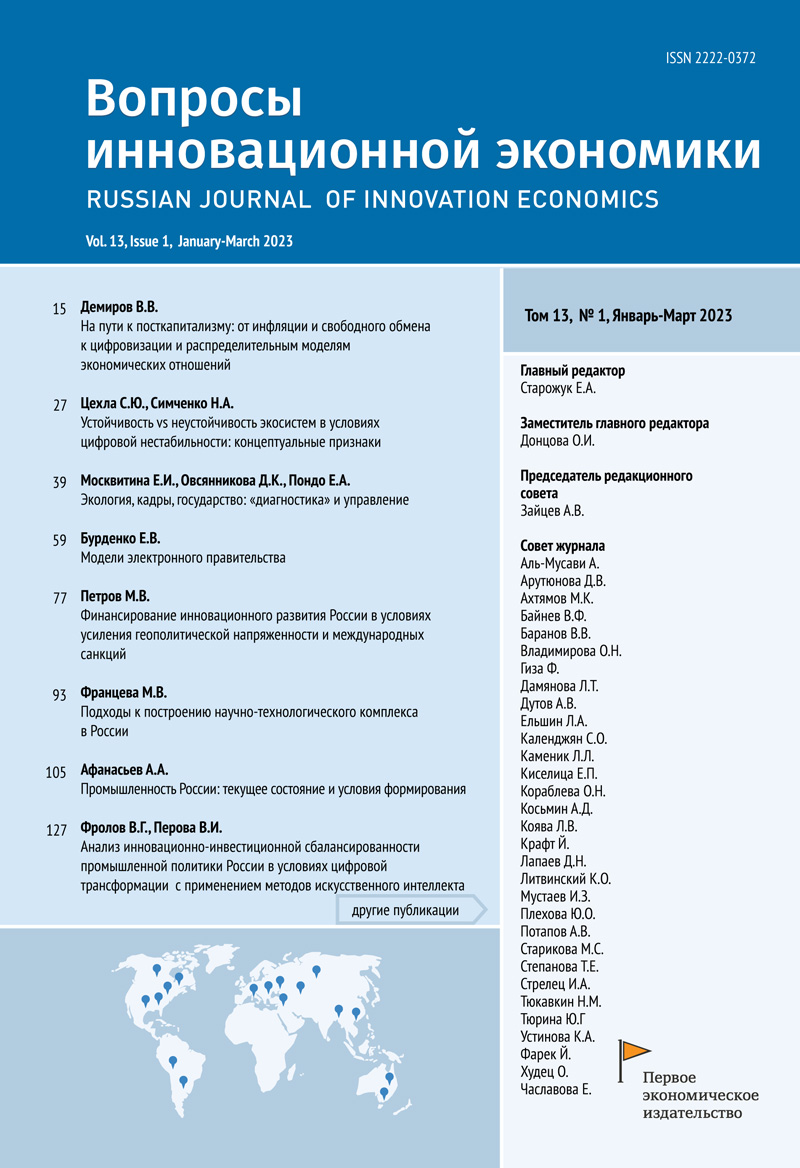Digital transformation: possibilities of applying end-to-end technologies in digital engineering projects
- 作者: Gorodnova N.V.1
-
隶属关系:
- Ural Federal University named after the first President of Russia B.N.Yeltsin
- 期: 卷 13, 编号 1 (2023)
- 页面: 173-192
- 栏目: Articles
- URL: https://journals.eco-vector.com/2222-0372/article/view/608062
- DOI: https://doi.org/10.18334/vinec.13.1.116394
- ID: 608062
如何引用文章
详细
The progressive, dynamic development of the economy and digital transformation are inextricably linked with new end-to-end digital technologies, such as machine algorithms of artificial intelligence, Big Data, as well as the implementation of digital engineering capabilities. In this regard, the research related to modelling the specifics of digital transformation in Russia, the decision-making process using the capabilities of artificial intelligence and other end-to-end technologies in digital engineering implementation programs can be recognized as relevant.The scientific novelty consists in the development of the theoretical foundations of the digital economy, in particular, in clarifying the conceptual and categorical apparatus, modelling the digital transformation of an organization, the process of making IIoT decisions by Russian companies and the IIoT maturity of decisions made, as well as in identifying the specifics of end-to-end technologies in digital engineering.The introduction of end-to-end technologies, including artificial intelligence systems and neural networks as part of the implementation of digital engineering projects, is one of the most relevant and promising areas within the framework of digital transformation and the development of digitalization of the Russian economy.The research results can be useful for specialists and experts in the IT and business spheres, scientists engaged in the study of socio-economic aspects and specifics of artificial intelligence algorithms, managers of digital engineering projects, as well as representatives of state authorities engaged in the digital transformation of regions.
作者简介
Natalya Gorodnova
Ural Federal University named after the first President of Russia B.N.Yeltsin
Email: n.v.gorodnova@urfu.ru
参考
- Афанасьев Д. Как искусственный интеллект меняет отношение бизнеса к покупателю // БИТ. Бизнес Информационные технологии. – 2019. – № 5(88). – c. 54-55.
- Владимирова И.Л., Барешенкова К.А. Цифровой инжиниринг в сфере закупок при реализации инвестиционно-строительных проектов // Экономика, предпринимательство и право. – 2020. – № 2. – c. 377-394. – doi: 10.18334/epp.10.2.100493.
- Иноземцева С.А. Технологии цифровой трансформации в России // Актуальные проблемы экономики, социологии и права. – 2018. – № 1. – c. 44-47.
- Кириллов П. Цифровая платформа для интернета вещей: универсальный продукт для умных производств, городов, зданий // Бизнес Территория. – 2018. – № 1. – c. 35-36.
- Красковский Д.Г. Интернет вещей и Smart City: Autodesk показал, как развивается транспортная инфраструктура в России // САПР и графика. – 2017. – № 8(250). – c. 44-49.
- Медяник Ю.В. Совершенствование системы инжиниринга инвестиционно-строительной деятельности // Вопросы инновационной экономики. – 2019. – № 2. – c. 501-514. – doi: 10.18334/vinec.9.2.40704.
- Сараева А.А. Применение технологии «Промышленный интернет вещей» на предприятии // Политехнический молодежный журнал. – 2021. – № 11(64). – doi: 10.18698/2541-8009-2021-11-748.
- Сумикова И.П. Промышленный интернет вещей: перспективы и риски использования в производстве // Актуальные научные исследования в современном мире. – 2021. – № 11-8(78). – c. 155-159.
- Тагаров Б.Ж. Цифровой кластер как новая форма экономической концепции // Креативная экономика. – 2021. – № 2. – c. 327-340. – doi: 10.18334/ce.15.2.111726.
- Абдрахманова Г.И., Вишневский К.О., Гохберг Л.М. и др. Тенденции развития интернета в России и зарубежных странах. / Аналитический доклад. - М.: НИУ ВШЭ, 2020. – 144 c.
- Уткина В.А., Емшанова Е.В. Основные проблемы развития интернета и онлайн-торговли в России // Молодой ученый. – 2016. – № 11(115). – c. 1031-1033.
- Хэ Я. Промышленный интернет – фундамент глобальных цифровых бизнес-моделей // Управление в социальных и экономических системах. – 2022. – № 31. – c. 61-62.
- Цыгляну П.П., Василенко Н.В. Мировой и российский рынки инжиниринговых услуг в нефтегазовом секторе: перспективы и ограничения развития // Вопросы инновационной экономики. – 2021. – № 4. – c. 1921-1936. – doi: 10.18334/vinec.11.4.114016.
- Чичерин А.Е. Эффективность государственного управления экономикой региона: содержание, оценка, направления повышения. / Дисс. … к-та эконом. наук. - Воронеж, 2019.
- Чаадаев К.В. Методология реинжиниринга бизнес-процессов // Экономика, предпринимательство и право. – 2020. – № 3. – c. 587-600. – doi: 10.18334/epp.10.3.100725.
- Шеве Г., Хюзиг С., Гумерова Г.И., Шаймиева Э.Ш. Индустрия 4.0 (Германия). Промышленный интернет вещей (Industrial Internet of Things) (США): разграничение понятий // Инвестиции в России. – 2019. – № 11(298). – c. 3-8.
补充文件








